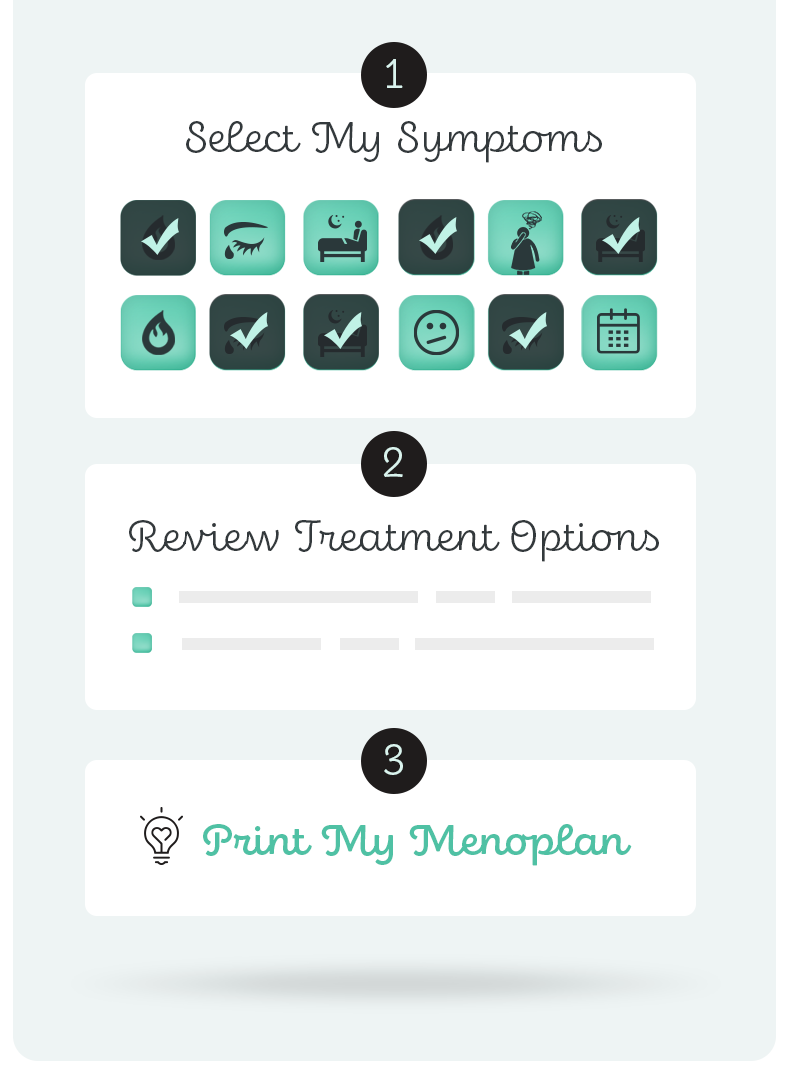Treatments
WHAT IS IT?
Gabapentin and pregabalin are medications that act on the brain. Gabapentin is used for seizures. It is used for nerve pain from herpes and other pains. It is also used to treat anxiety, insomnia, and mood disorders. Pregabalin is used for fibromyalgia pain, seizures, nerve pain and anxiety. Because of their effect on the brain, they have been studied for their effects on menopause symptoms.
OUR BOTTOM LINE, DOES IT HELP?
YES. For women with mild to moderate hot flashes and/or night sweats, trouble sleeping through the night, and physical aches and pains, gabapentin is worth trying. Risks are low and side effects minimal with the low doses used for these symptoms. Treatment begins with a low dose that is increased slowly. It should be taken at bedtime because of the potential sleep benefit of the drowsiness side effect. Pregabalin is used for women with fibromyalgia and bothersome menopausal symptoms. But, it is more expensive and can have adverse effects on platelets and muscle function.

HOT FLASHES & NIGHT SWEATS
There are only a few studies of gabapentin and pregabalin for hot flashes and night sweats. The studies were not ideal. But, they found that these drugs decreased hot flashes more than placebo and about the same as antidepressants and estrogen pills. Hot flashes decreased by 1-3 per day more than placebo. Gabapentin and pregabalin may also decrease the intensity and duration of hot flashes.

SLEEP PROBLEMS & INSOMNIA
Gabapentin may improve sleep in women with hot flashes.

MOOD, ANXIETY AND DEPRESSION
Gabapentin and pregabalin appear to help with anxiety but have not been studied for mood during perimenopause. Their effect in women with depression or anxiety related to menopause transition is not known.

ACHES AND PAINS
Gabapentin and pregabalin are effective in treating many types of chronic pain. But they have not been studied specifically for the aches and pains women have during perimenopause.

LOW SEX DRIVE
There are too few studies to know how gabapentin and pregabalin may affect sexual quality of life and sex drive. But in some studies women report a decrease in libido and inability to orgasm.

BRAIN FOG / COGNITIVE ISSUES
Some women taking gabapentin or pregabalin feel their alertness and cognition diminish as sleepiness can be a side effect.
POTENTIAL RISKS & SIDE EFFECTS
Studies show that about 10% of people who use gabapentin and pregabalin report dizziness and drowsiness. Both drugs may cause sexual dysfunction in a small number of women (loss of libido and inability to orgasm). Other potential side effects are: unsteady gait, blurred or double vision, headache, euphoria, confusion, vivid dreams, irritability, memory impairment, tremors, slurred speech, tingling sensations, vertigo, dry mouth, gastrointestinal side effects, weight gain and peripheral edema.
QUALITY OF LIFE EXPECTATIONS
One study found that gabapentin improved quality of life in women with hot flashes.
IF I WANT TO TRY THIS TREATMENT WHAT ARE MY NEXT STEPS?
If you want to try these medications you should discuss it with your health care provider.
Gabapentin doses range from 100 to 2700 mg daily. Begin treatment with gabapentin IR at 100- 300 mg nightly and slowly titrate up to 900-1200 nightly, and use lower doses during the day to minimize side effects. Ask your provider for a prescription but start very low at 100-300 mg at night and increase dose every 3-4 nights if you are not having side effects, but also have not had relief of symptoms.
Table: GABAergic therapies for vasomotor symptoms
|
GABA derivative (bolded = preferred daily dose for hot flash amelioration) |
N Completed, randomized |
Trial Duration (weeks) |
Frequency ↓ from baseline HF/d Active vs Placebo |
Frequency HF/d at baseline |
Overall ↓ # HF/d | Inclusion criteria only severe hot flashes |
| Gabapentin Immediate Release
300, 900 mg |
347, 420 59 193, 197 |
8 12 4 |
4.2 vs 2.2 5.8 vs 3.2 6.5 vs 4.5 |
8.7 10.6 8.5 |
~ 2.0-2.6 | + |
| Gabapentin Gradual Release*
600, 1200, 1800 mg |
593, 600 | 12 | 7.6 vs 6.5 |
11.9 >7 ** |
~1.1 | + |
| Pregabalin
150, 300 mg |
163, 207 | 6 | 4.6 vs 2.9 | >6 | ~ 1.5 | + |
↓= decrease, HF/d = hot flashes per day, * Moderate – Severe HF; ** Industry sponsored
Butt DA, Lock M, Lewis JE, Ross S, Moineddin R. Gabapentin for the treatment of menopausal hot flashes: a randomized controlled trial. Menopause. 2008;15(2):310-8.
Expert Opin Drug Saf. 2016 Jan;15(1):31-42.
Gabapentin package insert. ([http://labeling.pfizer.com/ShowLabeling.aspx?id=561]).
Guttuso T, Jr., Kurlan R, McDermott MP, Kieburtz K. Gabapentin’s effects on hot flashes in postmenopausal women: a randomized controlled trial. Obstet Gynecol. 2003;101(2):337-45.
Loprinzi CL, Qin R, Balcueva EP, Flynn KA, Rowland KM, Jr., Graham DL, et al. Phase III, randomized, double-blind, placebo-controlled evaluation of pregabalin for alleviating hot flashes, N07C1. J Clin Oncol. 2010;28(4):641-7.
Najmieh SAADATI, Razieh MOHAMMADJAFARI, Solmaz NATANJ, Parvin ABEDIThe effect of gabapentin on intensity and duration of hot flashes in postmenopausal women: a randomized controlled trial . Global Journal of Health Science, 5 (2013), pp. 126-130
Pandya KJ, Morrow GR, Roscoe JA, Zhao H, Hickok JT, Pajon E, et al. Gabapentin for hot flashes in 420 women with breast cancer: a randomised double-blind placebo-controlled trial. Lancet. 2005;366(9488):818-24.
Pinkerton JV, Kagan R, Portman D, Sathyanarayana R, Sweeney M. Phase 3 randomized controlled study of gastroretentive gabapentin for the treatment of moderate-to-severe hot flashes in menopause. Menopause. 2014;21(6):567-73.
Reddy SY, Warner H, Guttuso T, Jr., Messing S, DiGrazio W, Thornburg L, et al. Gabapentin, estrogen, and placebo for treating hot flushes: a randomized controlled trial. Obstet Gynecol. 2006;108(1):41-8.
Yang Y, Wang X. Sexual dysfunction related to antiepileptic drugs in patients with epilepsy. Expert Opin Drug Saf. 2016;15(1):31‐42. doi:10.1517/14740338.2016.1112376
Yurchesen ME. J Womens Health 2009 Sep;18(9):1355-60.
Authors: Dr. Lee Cohen, Dr. Katherine Newton, & Dr. Leslie Snyder. Last reviewed April, 2021



